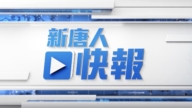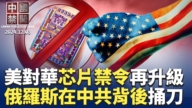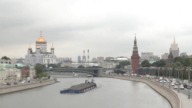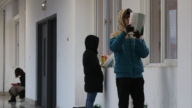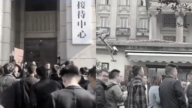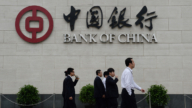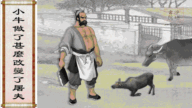【新唐人2011年12月10日訊】中國11月份居民消費價格指數(CPI)同比漲幅大幅回落到4.2%,低於10月份的5.5%,創下14個月以來最低水平。而一些分析師認爲,11月份通貨膨脹率大幅下降,低於預期,為決策層貨幣政策微調提供了空間。但是,中共政府的通脹數據真實性卻遭到專家和民眾的普遍質疑。
北京國家統計局12月9號公布,11月份全國居民消費價格CPI比去年同期上漲4.2%,其中,食品價格上漲8.8%,消費品價格上漲5.0%,服務項目價格上漲2.4%。1到11月平均CPI比去年同期上漲5.5%,是14個月以來的最低水平。
而《華爾街日報》所作的網絡調查顯示,87%的網民指出,中國的物價沒有下降。
《強國論壇》的網友們說:「蔬菜價格11月份上漲幅度比較大,降的只能是極個別的地方如山東的大白菜,內蒙的土豆,別的降了嗎!CPI中食品價格上漲還是很快,這是老百姓天天能感覺到的。」
財經評論家草庵居士向《新唐人》表示,中共政府不敢公布真實的通脹數據。
草庵居士:「中共的兩個解釋實際上是掩耳盜鈴的一個東西,中國實際上的通貨膨脹要遠比現在的CPI要嚴重的多。中國第三季度我們看到,整個的名義上GDP增長率大約在22%左右,但它的實際GDP增長率只有6%左右,所以,中國真正的通貨膨脹大約在16%左右。」
從11月份製造業採購經理指數(PMI)跌到臨界點下方;到最新數據顯示11月份的工業和投資也繼續放緩,都表明中國經濟在內外因素夾擊下慢慢降溫。
不過,《路透社》援引分析師的看法認為,這種降溫是「政策主動調控」的結果,在意料之中,而且11月份消費回升暗示內需穩健,這對中國經濟增長保持平穩,避免「硬著陸」將起到重要作用。
英國《BBC》說,許多分析人士預計,保增長將是中國政府的首要目標,在繼下調存款準備金率後,未來數週內,大陸央行很可能採取更多放寬政策。
「中銀國際」首席經濟學家曹遠征則認為,中國經濟面臨的硬著陸風險仍不容小覷,物價水平不會大幅下降。為此,明年全年的貨幣政策主基調仍將以穩健為主,局部政策微調仍將成為可能。
「中國人民大學」財政與稅收研究所副所長呂冰洋指出,政府的「財政擴張」是中國經濟失衡的重要原因,以「商品稅」為主的稅制結構,讓居民不敢多消費,促使收入分配向政府和國有企業傾斜。
「北京天則經濟研究所」副所長馮興元向《新唐人》表示,這就造成了「國進民退」的現象,嚴重阻礙了經濟增長方式的轉型。
馮興元:「貨幣政策走向穩健、信貸控制要放鬆一點是正常的,關鍵是它現在還是財政擴張支出太厲害。那麼,總體上需要減少管制,甚至減稅,推行普適性的競爭政策,而不是不斷的搞產業政策等等,就是要改善競爭環境、生存環境。」
備受關注的中央經濟工作會議即將召開,專家們普遍預計,穩健貨幣的政策基調明年仍會延續,經濟工作重心將落在穩增長、抑通脹和調結構。
新唐人記者常春、李元翰、蕭宇採訪報導。
China’s November CPI Eases to 4.2%, People Questioned
China’s consumer price index (CPI) growth rate eased to 4.2%
year-on-year in November, which is lower than October’s 5.5%, and is the lowest in 14 months.
Some analysts said the November inflation rate had dropped
significantly, reaching a lower level than expected,
giving space for decision-makers to change the monetary policy.
But experts and others questioned the truth of the data.
Beijing National Bureau of Statistics released the news on Dec. 9
that compared with the past year, November’s CPI rose 4.2%.
Within it, food prices rose 8.8%, consumer prices rose 5.0%,
service prices rose 2.4%.
In the first 11 months of this year, the average monthly CPI increased by 5.5%.
November’s CPI rising rate is the lowest in the last 14 months.
Wall Street Journal did an online survey which showed that
87% of Chinese netizens didn’t feel that the cost of living had decreased.
Netizens said on Strong Nation Forum: “The price of
vegetables has increased sharply.
Only certain foods have decreased in some areas for example
cabbage in Shandong province, potato in Inner Mongolia.
Has there been any other price decrease?”
“Food prices have increased very quickly,
that is something that people can feel in their daily lives .”
Cao’an Jushi, an economic commentator told NTD, the Chinese
government doesn’t dare to publish the real inflation data.
Cao’an Jushi:”Two explanations by CCP are actually
self-deceiving.
In fact, the inflation is much more serious than the CPI that
the CCP has published.
In the third quarter, China’s GDP was said to have increased
by 22%, but actually it’s about 6%. So, the real inflation in China is about 16%.”
China 『s November manufacturing Purchasing Managers’
Index (PMI) fell below the critical point.
The newest data shows that the November industry and
investment has continued to slow down.
All of these figures show that the Chinese economy
is cooling down with inside and outside factors.
However, Reuters has quoted an analyst’s view that this
cooling is a result of “policy active control" which can be expected.
Consumption increase in Nov. shows domestic demand is
stable, which is important for the Chinese economy to remain steady, and to avoid a “hard landing”.
The has BBC said that, many analysts have estimated that ensuring growth
is the first priority of Chinese government.
After reducing the deposit reserve ratio, China central bank is likely to take
more relaxed policies in the next few weeks.
Cao Yuanzheng, chief economist of Bank of China thinks that,
there’s still a big risk that the Chinese economy will have a “hard landing”, and that the price level will not decline.
So, the monetary policy will be based on stabilizing next year,
and it’s possible that there will be some light adjustment in some parts.
Lu Bingyang, the deputy director of Finance & Tax Institute,
at the China Renmin University pointed out that
the main reason for the Chinese economy’s imbalance is
the government’s “fiscal expansion” policy.
It set up a commodity – based tax system in which people
don’t dare to spend, as well as an income distribution which benefits the government and state-owned enterprises.
Feng Xingyuan, the deputy director of Beijing Tianze Economic
Institute told NTD that
the policy had created the phenomenon of “ state-owned
businesses expanding and the private sector shrinking ”,
which in turn blocks the transformation of
the economy’s growth mode.
Feng Xingyuan: “If monetary policy is to be more stable,
It be better to loosen credit control a little.
The key is that the Chinese government’s fiscal spending
has expanded too much.
Then, overall there is a need for the government to reduce
control, or even to apply tax decreasing.
There is need for a universal competition policy,
rather than continuous engagement in industrial policy,
which means that there is a need to improve the competitive
and living environment.”
The most important Central Economic Work Conference will
be held soon, and experts are expecting that
the steady tone of monetary policy will continue next year,
and that the economic focus will be on steady economic growth, curbing inflation and structural adjustment.
NTD Reporters: Chang Chun, Li Yuanhan and Xiao Yu


